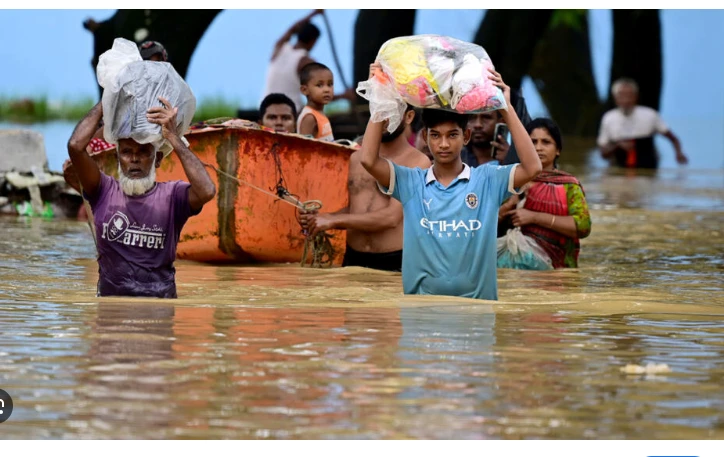Flood deluge worsens in Bangladesh with millions affected

Stay tuned with 24 News HD Android App

Flash floods wrought havoc in Bangladesh on Friday as the country recovers from weeks of political upheaval, with the death toll rising to 13 and millions more caught in the deluge.
The South Asian nation of 170 million people, crisscrossed by hundreds of rivers, has seen frequent floods in recent decades.
The annual monsoon rains cause widespread destruction every year, but climate change is shifting weather patterns and increasing the number of extreme weather events.
"It's a catastrophic situation here," rescue volunteer Zahed Hossain Bhuiya, 35, told AFP from the worst-hit city of Feni. "We are trying to rescue as many people as we can."
Much of Bangladesh is made up of deltas where the Himalayan rivers, the Ganges and the Brahmaputra, wind towards the sea after coursing through India.
All the major tributaries of the two transnational rivers were overflowing, according to local media reports.
Nur Islam, a shopkeeper in Feni, said his home had been completely submerged.
"Everything is underwater," the 60-year-old said.
Bangladesh's disaster management ministry said in a bulletin that the latest toll of 13 deaths included fatalities in cities along the country's southeastern coast.
That included the main port city of Chittagong and Cox's Bazar, a district home to around a million Rohingya refugees from neighbouring Myanmar.
Areas east of the capital Dhaka were also badly hit including the city of Comilla, near the border with Tripura state in India.
Nearly 190,000 others were taken to emergency relief shelters, according to the bulletin, while altogether 4.5 million people had been affected in some way.
Altogether 11 of the country's 64 districts were affected by the flooding, the ministry said.
- Diplomatic tensions -
The floods come less than three weeks after the ouster of ex-premier Sheikh Hasina, who was forced to flee by helicopter to India, her government's biggest political patron, during a student-led uprising.
Hasina's 15-year rule saw widespread human rights abuses, including the mass detention and extrajudicial killings of her political opponents.
She was replaced by Nobel laureate Muhammad Yunus, who is heading an interim government facing the monumental task of charting democratic reforms ahead of expected new elections.
Asif Mahmud, a leader of the student protests that ousted Hasina who is now in Yunus' caretaker cabinet, had earlier accused India of "creating a flood" by deliberately releasing water from dams.
India's foreign ministry rejected the charge, saying its own catchment area had experienced the "heaviest rains of this year" this week, and that the flow of water downstream was due to "automatic releases".
Indian Prime Minister Narendra Modi's Hindu-nationalist government backed Hasina's rule over her rivals from the Bangladesh Nationalist Party, which it saw as closer to conservative Islamist groups.
Modi has offered his support to the Yunus administration.
